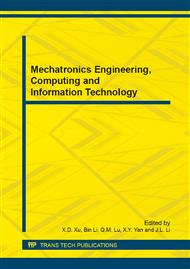[1]
Hou Jingliang, Li Yuanfu. Team incentive effect analysis based on incentive theory - an empirical study of Chinese construction project [J]. Journal of Southwest Jiao Tong University, 2011(2): 34-40.
Google Scholar
[2]
Wang Yuanming. Cloud computing security model [J]. Journal of Zhejiang Wanli University, 2012(11): 56-59.
Google Scholar
[3]
Zhu Bangzhu, Lin Jian. Group decision entropy model of partner selection of virtual logistics enterprise [J]. Productivity research, 2011(3): 18-22.
Google Scholar
[4]
Shen Lixin, Chen Yan, Sun Zhaogang. Information management system of virtual logistics enterprise alliance based on MAS theory [J]. Science technology and engineering, 2012(2): 45-49.
Google Scholar
[5]
Shi Song. Enterprise knowledge management system integration framework of oriented decision support [J]. Technology innovation herald, 2012(5): 78-81.
Google Scholar
[6]
Shen Lixin, Chen Yan, Sun Zhaogang. The selection model and solving algorithm of virtual logistics alliance partner selection based on double levels programming [J]. Science technology and engineering, 2012(4): 23-29.
Google Scholar
[7]
Mike Burrows. The Chubby lock service for loosely -coupled distributed systems [A]. OSD Ip06: Proceedings of the7th Symposi2um on Operating System Design and Implementation[C]. New York: ACM Press, 2010(2): 118-124.
Google Scholar
[8]
He Zheng, Chen Juhong. Research on ERP software selection decision support system [J]. Science research management, 2012(1): 34-39.
Google Scholar
[9]
Deng Julong. Basic method of gray system [M]. Huazhong University of science and Technology Press, 2010: 56-78.
Google Scholar
[10]
Ron Martin, Peter Sunley. Deconstructing cluster: chaotic concept or policy panacea [J]. Journal of Economic of Geography, 2012(4): 34-37.
Google Scholar
[11]
Lin Ziyu. Study of the cloud database [J]. Journal of Software, 2012, 23(5): 45-48.
Google Scholar
[12]
Pearson, Siani, Sander, Tomas. A mechanism for policy-driven selection of service providers in SOA and cloud environments [J]. New Technologies of Distributed Systems (NOTERE), 2010(4): 333-338.
DOI: 10.1109/notere.2010.5536569
Google Scholar
[13]
Yokoyama Masanori. The spill-over effects of macroeconomic policies in two countries model [J]. The commercial review, 2011(401): 117-122.
Google Scholar
[14]
Sun Shuihua, Lin Zhiqiang. Research on decision support system of ETL construction technology [J]. Journal of Fujian University of Technology, 2011 (1): 18-22.
Google Scholar


